This page is based on this
Wikipedia article Text is available under the
CC BY-SA 4.0 license; additional terms may apply.
Images, videos and audio are available under their respective licenses.
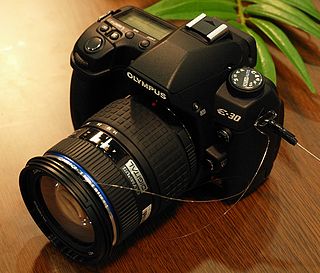
The Zuiko Digital 14–54 mm f/2.8–3.5 II is a Four Thirds System Pro series lens by Olympus Corporation, sold in a kit with the Olympus E-30 camera body and available separately. It is positioned just below the Olympus Zuiko Digital ED 12–60mm 1:2.8–4 SWD in terms of size, weight, focusing speed, price and focal length range, while having larger apertures. It replaces the Olympus Zuiko Digital 14–54mm 1:2.8–3.5, which had a longer minimum focusing distance.
The Olympus Zuiko Digital ED 9–18mm 1:4.0-5.6 is a Four Thirds System lens.
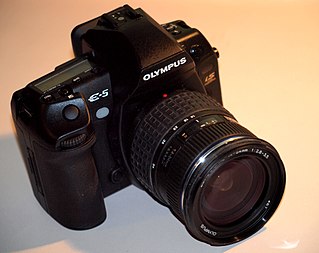
The Olympus E-5 was Olympus Corporation's flagship camera, positioned as a professional DSLR camera. It is the successor to the Olympus E-3, which was launched on October 17, 2007. The E-5 was announced on September 14, 2010. The E-5, like the other cameras in the Olympus E-series, conforms to the Four Thirds System.

The Panasonic Leica DG Summilux 25mm f/1.4 lens is a normal lens for Micro Four Thirds system cameras. It is co-branded between Leica and Panasonic, built in Japan under Leica management.
Zuiko is a brand of optical lenses made by Olympus Corporation that was used up to and including the Four Thirds system era. At the inception of the Micro Four Thirds system, new lenses for that system started to be branded as M.Zuiko Digital.
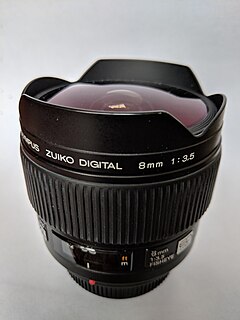
The Olympus Zuiko Digital ED 8mm f/3.5 Fisheye is an interchangeable "full-frame" or diagonal fisheye lens for Four Thirds system digital single-lens reflex cameras, announced by Olympus Corporation on June 30, 2005.

The Olympus Zuiko Digital ED 50mm 1:2.0 Macro is an interchangeable macro lens for the Four Thirds system with 1:2 maximum magnification. It was announced by Olympus Corporation on June 24, 2003.

The Olympus Zuiko Digital ED 150mm 1:2.0 is an interchangeable camera lens announced by Olympus Corporation on September 27, 2004.
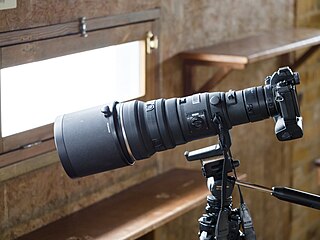
The Olympus Zuiko Digital 300mm 1:2.8 is an interchangeable camera lens announced by Olympus Corporation on June 24, 2003. As the largest and heaviest lens in the Zuiko Digital line, the ZD300mm f/2.8 was given the nickname "Big Tuna".
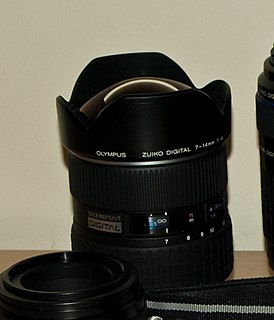
The Olympus Zuiko Digital ED 7-14mm 1:4.0 is an interchangeable camera lens for DSLR cameras using the Four Thirds system announced by Olympus Corporation on September 27, 2004.
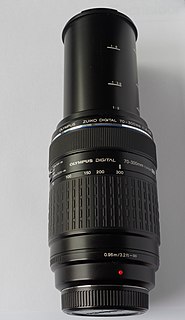
The Olympus Zuiko Digital ED 70-300mm 1:4.0-5.6 is an interchangeable telezoom lens for Four Thirds. It was announced by Olympus Corporation on June 26, 2007.
The Olympus Zuiko Digital ED 90-250mm 1:2.8 is an interchangeable telezoom lens announced by Olympus Corporation on February 17, 2005.
The Olympus Zuiko Digital ED 35-100mm 1:2.0 is an interchangeable camera lens announced by Olympus Corporation on February 17, 2005.
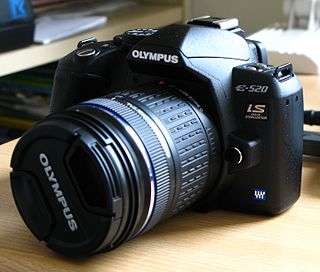
The Olympus Zuiko Digital ED 40-150mm 1:4.0-5.6 is an interchangeable moderate telezoom lens for the Four Thirds system. It was announced by Olympus Corporation on September 27, 2004.

The Olympus Zuiko Digital ED 50-200mm F2.8-3.5 SWD is an interchangeable lens for Four Thirds system digital single-lens reflex cameras announced by Olympus Corporation on October 17, 2007. It added a ultrasonic motor to the existing optical formula of the Olympus Zuiko Digital ED 50-200mm F2.8-3.5 introduced in 2003; it is slightly larger and heavier than the earlier lens.

The Olympus Zuiko Digital ED 14-35mm 1:2.0 SWD is an interchangeable camera lens announced by Olympus Corporation on February 17, 2005.
Olympus M.Zuiko Digital ED 8 mm f/1.8 Fisheye Pro is an optically corrected fisheye lens.

The Zuiko Digital 14–54 mm f/2.8–3.5 is a Four Thirds System High Grade series lens by Olympus Corporation, initially sold in a kit with the Olympus E-1 camera body and also available separately. Three glass aspherical lenses are used in its optical formulation. It was positioned as an upgrade to the 14-45mm kit lens in terms of focal length range while having larger apertures. It was replaced as the premium kit lens by the Olympus Zuiko Digital ED 12-60mm f/2.8-4 SWD with the release of the E-3, and later was directly replaced by the Olympus Zuiko Digital 14-54mm f/2.8-3.5 II, which is more suited for mirror-up or mirrorless operation.

The Olympus Zuiko Digital ED 50-200mm F2.8-3.5 is an interchangeable lens for Four Thirds system digital single-lens reflex cameras announced by Olympus Corporation during the system launch on June 24, 2003. The SWD version is equipped with an ultrasonic motor for focusing, and was introduced in 2007 with the Olympus E-3.















